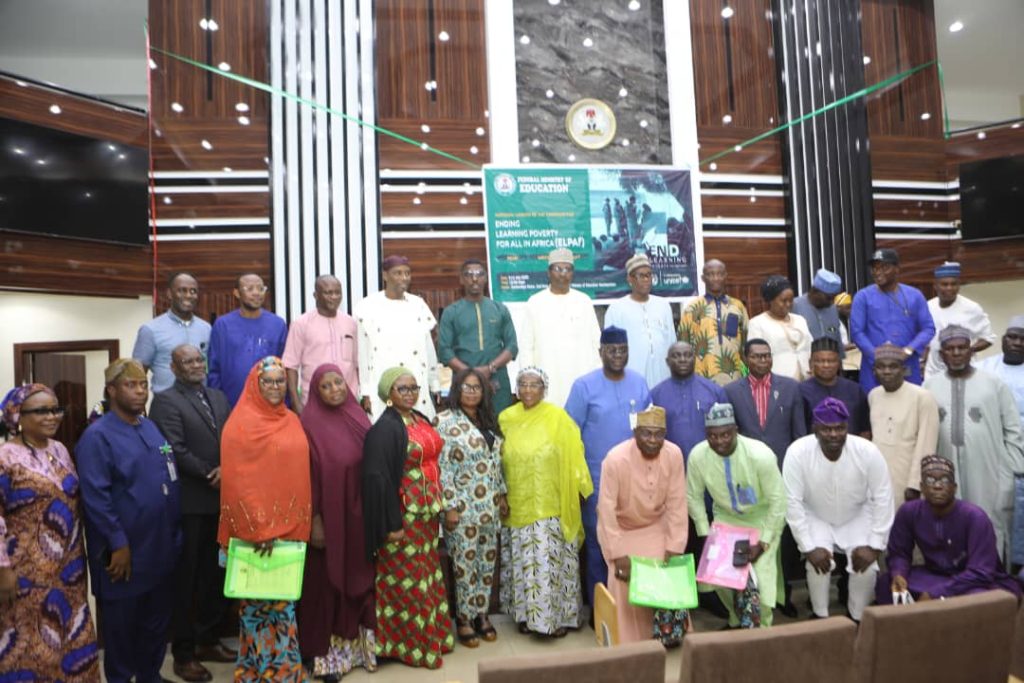Kabiru Haruna
In a landmark move aimed at transforming education across the continent, the Honourable Minister of State for Education, Professor Suwaiba Sa’id Ahmad, has officially launched the Ending Learning Poverty for All in Africa (ELPAF) campaign.
The event marked a significant milestone in Africa’s collective journey toward ensuring that no child is left behind in acquiring the foundational skills necessary to thrive in the 21st century.
Represented by the Permanent Secretary of the Federal Ministry of Education, Mr. Abel Olumiyiwa Enitan, the Minister stated that the campaign is not just a commemorative occasion but a call to action.
Kano Delegation Studies KwaraLEARN to Tackle Learning Poverty
“We are here not only to commemorate the launch of another important umbrella initiative but to commit ourselves to a transformative journey that aligns foundational learning with the demands of our time,” she noted.
Highlighting the urgency of the issue, the Minister referenced the World Bank’s 2019 definition of Learning Poverty as the inability of a 10-year-old to read and understand a simple text.
She described the statistics across sub-Saharan Africa as “staggering and sobering,” revealing that over 80% of children are affected.
Vigilante Education Initiative Kicks Off in Kano to Promote Inclusive Learning
Many children, she added, are in school but not learning a condition she termed “the silent erosion of human potential,” which feeds cycles of poverty, inequality, and social instability.
To reverse this trend, she emphasised the need for urgent, coordinated, and collaborative action across the continent.
She also reaffirmed the commitment of President Bola Ahmed Tinubu’s administration, under the Renewed Hope Agenda, which places education at the heart of national development.
Among Nigeria’s strategic interventions mentioned were the National Foundational Literacy and Numeracy Programme, Nigeria Learning Passport, Accelerated Basic Education Programme, and ongoing reforms in teacher education.
“The ELPAF campaign is an opportunity for African nations to synchronise their efforts, strengthen education financing, prioritise foundational learning, and combat poverty in classrooms, rural communities, and IDP camps alike,”
Professor Ahmad also called on African governments to elevate learning to a top political priority and to engage youth as ambassadors for the campaign. “Learning is not a privilege for a few, but a right for all,”
In her welcome address, Hajiya Larai Nana Ahmed, Director of Education Support Services, provided an overview of Nigeria’s foundational learning landscape.
She acknowledged persistent challenges such as overcrowded classrooms and language barriers but noted ongoing efforts by the Federal Ministry of Education to tackle them.
These include the Home-Grown School Feeding Programme, inclusive education strategies, teacher capacity-building workshops, and the Nigeria Education Sector Renewal Initiatives (NESRI).
Dr. Loudoun Mary Omolara, Assistant Director of Bilateral Agreements, emphasised that Nigeria’s commitment to the campaign aligns with the African Union’s broader education reform goals.
In her closing remarks, Mrs. Onoja Joy, Deputy Director of Basic Education, thanked the Ministers and the Permanent Secretary for their leadership.
She urged Executive Secretaries and Education Directors to drive the implementation of the campaign at all levels.
The campaign serves as a continental wake-up call, advocating for stronger partnerships with international donors and development agencies worldwide to collectively combat learning poverty and promote inclusive quality education for every African child.





